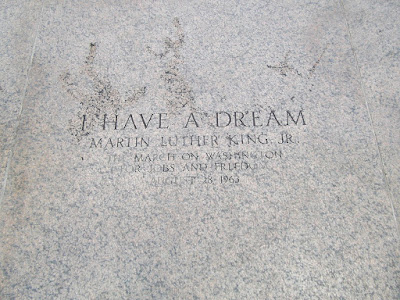 |
| Ron van der Werf |
"I Have a Dream" came to be regarded as one of the finest speeches in the history of American oratory.
It is a public speech that was delivered by American civil rights activist and Baptist minister Martin Luther King Jr. (born January 15, 1929, Atlanta, Georgia, and died April 4, 1968, Memphis, Tennessee.
King participated in and led marches for blacks´right to vote, desegregation labor rights, and other civil rights.
He advanced civil rights through nonviolence and civil disobedience, inspired by Christian beliefs and the nonviolent activism of Mahatma Gandhi (1869-1948).
King led the 1955 Montgomery bus boycott and later became the first president of the Southern Christian Leadership Conference (SCLC).
As president of the SCLC, he led the unsuccessful Albany Movement in Albany, Georgia, and helped organize some of the nonviolent 1963 protest in Birmingham, Alabama.
King helped organize the 1963 March on Washington, where he delivered his famous "I have a Dream" speech on the steps of the Lincoln Memorial.
 |
| "View from the Lincoln Memorial toward the Washington Monument on August 28, 1963" |
"I Have a Dream" Speech by Martin Luther King Jr. at the "March on Washington" 1963:
"...we cannot walk alone. And as we walk we must make the pledge that we shall always march ahead. We cannot turn back. There are those who are asking the devotees of civil rights: "Wenn will you be satisfied?"
"We can never be satisfied as long as the Negro is the victim of the unspeakable horrors of police brutality"
"We can never be satisfied as long as our bodies, heavy with the fatigue of travel, cannot gain lodging in the motels of the highways and the hotels of the cities"
"We cannot be satisfied as long as the Negro´s basic mobility is from a smaller ghetto to a larger one. We cannot be satisfied as long as our children are stripped of their adulthood and robbed of their dignity by signs stating "For Whites Only"
"We cannot be satisfied as long as the Negro in Mississippi cannot vote and the Negro in New York believes he has nothing for which to vote"
"No, no, we are not satisfied, and we will not be satisfied until justice rolls down like waters and righteousness like a mighty stream..."
"I say to you today, my friends, though, even though we face the difficulties of today and tomorrow, I still have a dream..."
 |
| Martin Luther King "March on Washington" (1963) |
"We hold these truths to be self-evident, that all men are created equal"
"I have a dream that one day on the red hills of Georgia sons of former slaves and the sons of former slaves-owners will be able to sit down together at the table of brotherhood. I have a dream that one day even the state of Mississippi, a state sweltering with the heat of injustice, sweltering with the heat of oppression, will be transformed into an oasis of freedom amd justice"
"I have a dream that my four little children will one day live in a nation where they will not be judged by the color of their skin but by the content of their character"
"I have a dream today...
...this will be the day when all of God´s children will be able to sing with new meaning:
"My country, ´tis of thee, sweet land of liberty, of thee I sing.
Land where my fathers died, land o the pilgrim´s pride,
from every mountain side, let freedom ring.
When we allow freedom to ring...
we will be able to join hands and sing in the words of the old Negro spiritual:
"Free at last, Free at last, Great God a-mighty. We are free at last"
 |
| Martin Luther King Jr. in 1964 "I still have a dream..." |
The National Civil Rights Museum
The March, and specially King´s speech, helped put civil rights at the top of the agenda of reformers in the United States and facilitated passage of the Civil Rights Act of 1964.
On October 14, 1964, King won the Nobel Peace Prize for combating racial inequality through nonviolent resistance.
In 1968, King was planning a national occupation of Washington, D.C., to be called the "Poor People´s Campaign", when he was assassinated on April 4.
King was fatally shot by James Earl Ray.
The "Lorraine Motel" in Memphis, Tennessee, where King was assassinated, is now the site of the National Civil Rights Museum.

